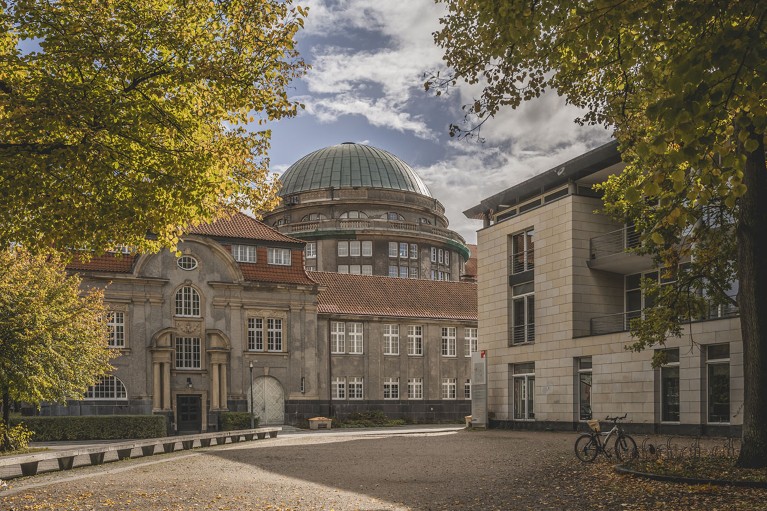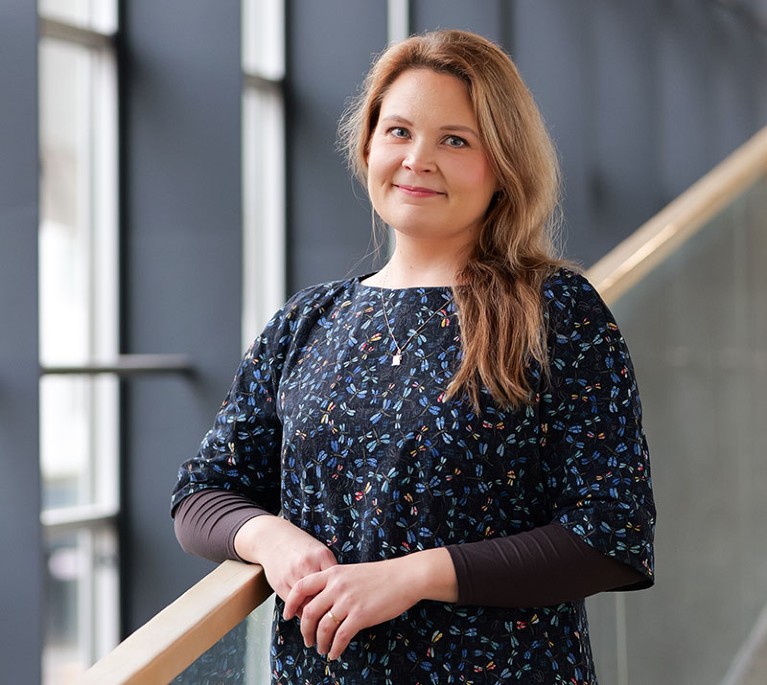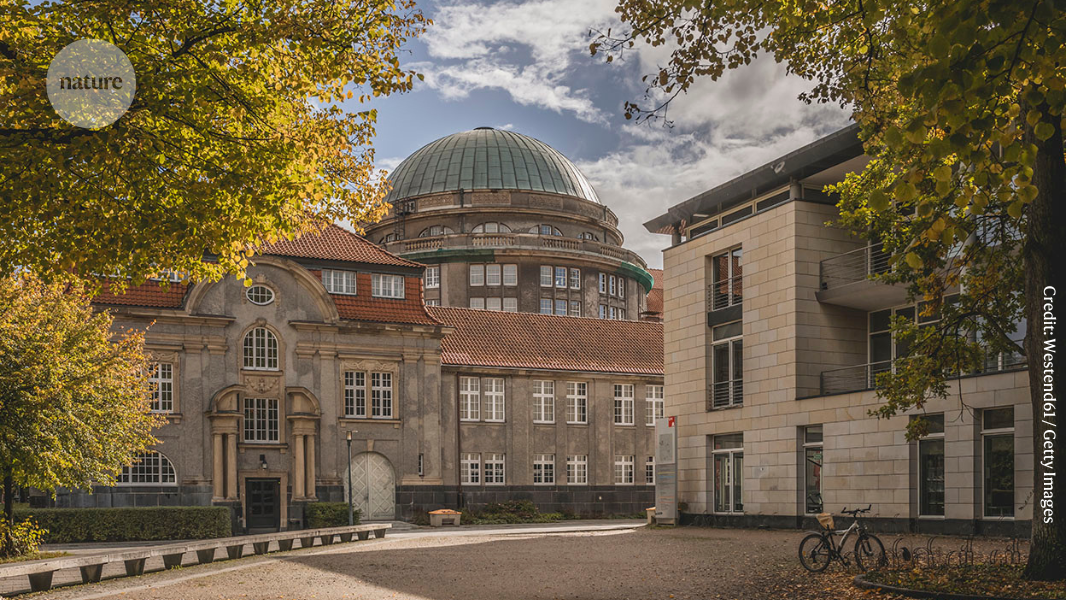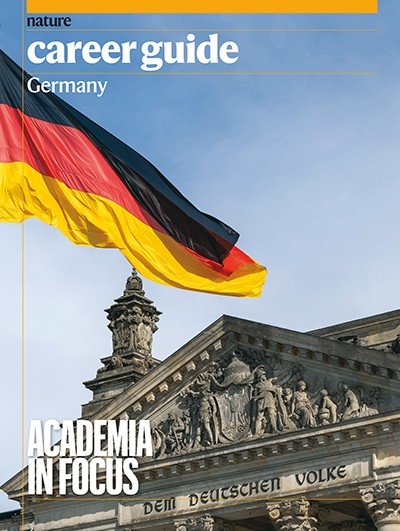
Some German universities, such as the University of Hamburg, are trying to add more permanent research positions.Westend61 / Getty Images
After 13 years of jumping between temporary contracts at German institutions, Dorothée Goetze, who was a history postdoc, was fed up. So in 2021, when she was offered a full-time, permanent lecturing position at Mid Sweden University in Sundsvall she leapt at the opportunity.
Part of the reason for leaving was simple: the permanence of the new post, a rarity both in and outside Germany. But Goetze says that there were other troubling aspects of German academia that led her to expand her job search. “When I started to look at other countries, I realized that there are other ways to structure an academic system.”
Although Germany has become a hub for international students and researchers, attracting a growing number of foreign scholars each year, those who remain in academia after graduation often face an intensely hierarchical system with few permanent positions. This has led many, including Goetze, to search for jobs at universities and research institutions outside the country — or, in some cases, to leave academia completely.
Nature Career Guide: Germany
Last year, the Postdoc Network of the Max Planck Society published a survey of close to 900 postdocs from 74 of the 85 Max Planck Institutes, in which only one-quarter of international respondents said that they were sure they wanted to stay in Germany after their postdoc (see go.nature.com/486jceo). A similar survey by the postdoc network of the Leibniz Association revealed that some 42% of respondents had considered moving abroad (see go.nature.com/3xesmtz).
“There are a lot of good reasons to embark on a PhD or research career in Germany,” says Shyam Krishnan, a stem-cell biologist at the Leibniz Institute for Natural Product Research and Infection Biology in Jena, Germany, and a spokesperson for the Leibniz PostDoc Network. These include the country’s globally respected research profile and ample opportunities for funding and collaborations, according to Krishnan.
However, it is not always possible for early-career researchers to take advantage of these benefits — for example, most are on short-term contracts that don’t align with the long grant-application processes, Krishnan says. “When it comes to career paths, it becomes really difficult, especially for people coming from abroad.”
A popular destination
In 2025, Germany had the fourth highest number of international students globally, according to the Organisation for Economic Co-operation and Development (OECD), a figure totalling around 423,000 people.
The number of international students in Germany has steadily increased in the past decade, thanks to factors such as the affordability of education, a high quality of life and employment opportunities after graduation. Between 2013 and 2023, the Wissenschaft weltoffen report — using data from the German Academic Exchange Service (DAAD) and the German Centre for Higher Education Research and Science Studies (DZHW) — highlighted a 74% rise in the number of foreign students enrolled at German universities. The majority of these individuals were in bachelor’s or master’s programmes.
A structured system: the secrets of Germany’s scientific reputation
International scholars are also common at the postdoctoral level and above. In 2022, foreign nationals made up around 15% of academic staff members across German universities — encompassing all roles from graduate-student research assistants to professors. At the Max Planck institutes, which employ the highest proportion of foreign scholars, more than half of the researchers come from abroad.
These numbers will probably continue to rise. In the past few months alone, there have been several announcements of initiatives aimed at recruiting international students and scholars. In October, for example, the DAAD launched Academic Horizons, a funding programme that helps universities to attract international scholars to master’s and doctoral programmes in disciplines such as artificial intelligence and quantum technology.
There are also several efforts aimed at attracting talent from the United States, where cuts to science funding and decreased workforce numbers have led many researchers to consider leaving the country. The Volkswagen Foundation, for example, recently announced the Transatlantic Bridge Professorships, which will provide financial support for US-based professors who are working on topics such as democracy and academic freedom to conduct their work in Germany.
To stay or to leave?
Although Germany is an attractive destination for scholars, those who remain in the academic system after their doctoral studies face notable challenges. Two of the frequently cited issues are a lack of job security, owing to the lack of permanent positions, and a strictly hierarchical system that places a disproportionate amount of power in the hands of a few.
In German academia, short-term contracts are the norm: according to the 2025 National Report on Early Career Researchers (known as the BuWik), a mere 4% of early-career researchers are not on a temporary contract (see go.nature.com/4i78g4o). Older and more-experienced researchers tend to be in more permanent positions — this includes 38% of doctorate holders aged between 40 and 45 and 28% of junior research group leaders.
Are these the happiest PhD students in the world?
In a bid to alleviate this problem, the German government passed the Academic Fixed-Term Contract Act in 2007 (also known as the Wissenschaftszeitvertragsgesetz, or WissZeitVG; see go.nature.com/48kzoyl). This law limits the time that early-career researchers can be placed on fixed-term contracts to, in most cases, six years pre-PhD and six years post-PhD (nine years after medicine PhDs), with the intention of encouraging universities to hire these researchers permanently, rather than keeping them temporarily employed indefinitely.
However, critics of the WissZeitVG argue that it backfired because it failed to lead to a growth in permanent positions. They say that it instead forces researchers out of academia — leading to knock-on effects such as lower-quality research and a loss of qualified personnel. “What universities do in most cases is say, ‘We cannot employ you temporarily any more, so we won’t employ you,’” says Mathias Kuhnt, a sociology postdoc at the Dresden University of Technology.
In some fields, such as social science and the humanities, contracts are not only short-term; they’re also often part-time. Amrei Bahr, a philosopher at the University of Stuttgart, has had fixed-term, mostly part-time contracts during and after her doctoral studies. Now, with her non-tenure-track junior professorship, Bahr is on a four-year contract with a possible two-year extension. “If I get the two years, I will be 42 once this is over,” Bahr says. “Then I will probably drop out.” Bahr is currently applying for other, longer-term professorships, but given the dearth of these positions, dropping out of academia is a likely outcome.
Planning an exit
Bahr is not alone. In 2024, the DZHW published a Barometer for Science report — a nationwide survey that included more than 11,000 academics in Germany — which revealed that 57% of researchers had contemplated leaving academia in the past two years (see go.nature.com/3jdogk0). Among postdocs on fixed-term contracts (which make up the majority), this rose to 71%. Work–life balance, workload and the WissZeitVG were cited as contributing factors.

Historian Astrid Wendel-Hanson left Germany for a position with a longer-term contract.Marten Puidak
“Germany is incredibly valuable in terms of the resources it has for academics,” says Astrid Wendel-Hanson, a historian who moved to Germany after her PhD, but left earlier this year after accepting a position as an associate professor at Tallin University in Estonia. “But it can be very difficult to stay optimistic and to remain in a system that seems to actively be trying to push you away.” Although one of the reasons for the move was to be closer to family, Wendel-Hanson’s new contract is four years long — longer than what would be permitted under the WissZeitVG.
Germany is not the only country with precarious employment in academia, however. According to a 2024 OECD report, in Australia, casual hires — those on hourly or seasonal contracts — make up the majority of academic staff members, and in the United States, part-time and non-tenure-track positions are increasingly becoming the norm (OECD. The State of Academic Careers in OECD Countries; 2024).





